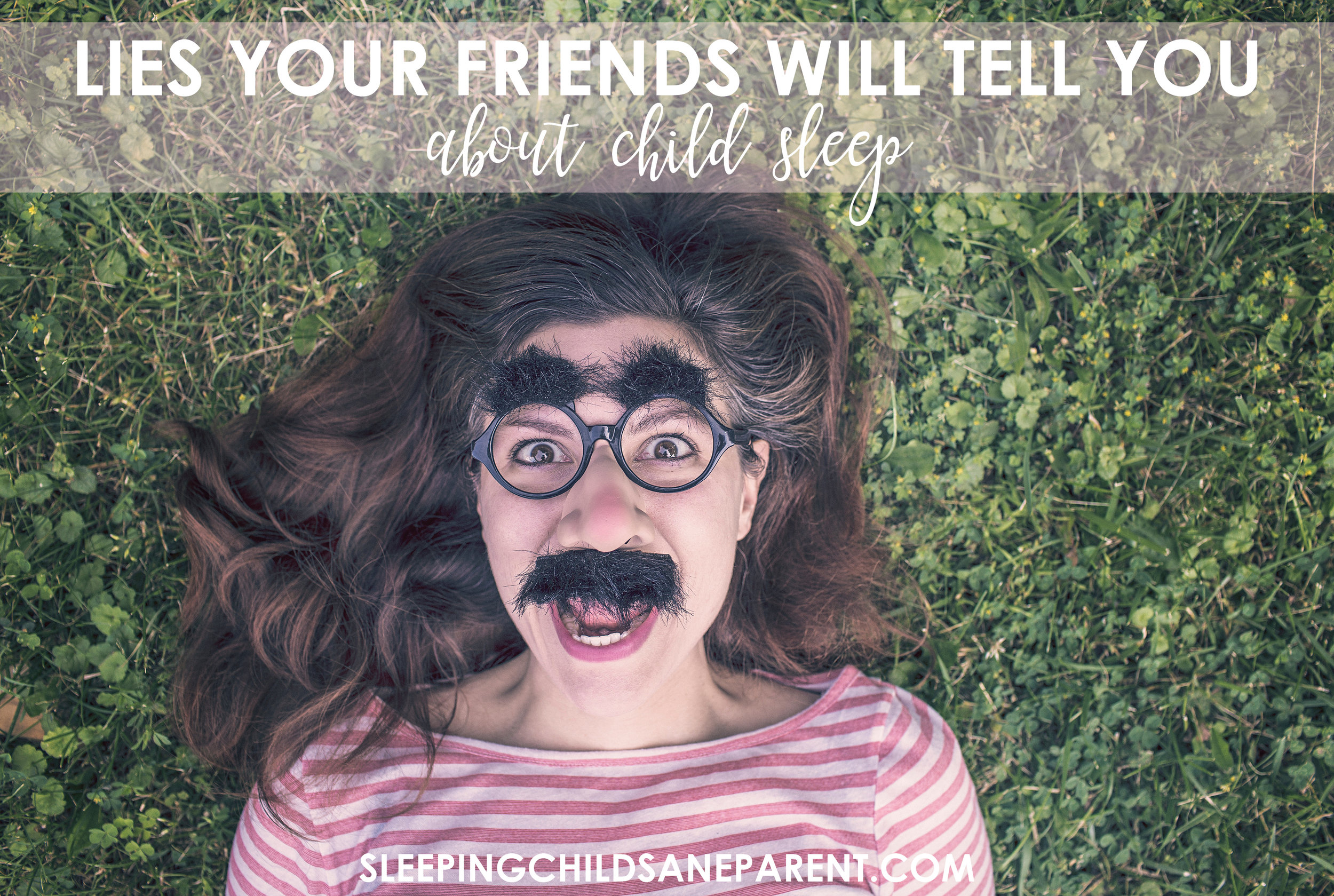Have you ever learned a new word and then you started hearing it everywhere? It's like the word didn't exist before you learned it, but once you did, everyone seemed to be saying it.
Well, as a mama, I never really noticed what other people were saying about sleep. But since becoming a consultant, I often hear sleep advice given from one parent to another that makes me cringe because of what I know now about child sleep. People are well-meaning, but my hope is to obliterate these lies so that parents stop spreading them to other parents. Today, I'm debunking 3 common lies about child sleep.
Lie #1: Never Wake a Sleeping Baby
This is a really common one. After all, parents can have so many difficulties with child sleep, so why on earth would you wake the baby if she's finally sleeping?! There are actually a few different reasons.
1. For everyone to get more sleep at night.
When Baby is in the womb, mom's movement throughout the day often lulls Baby to sleep, and then when mom is still and sleeping at night, Baby can party! This is the cause of many newborn babies having their days and nights mixed up. What that means is that Baby may be more likely to take a nice, long nap during the day, followed by waking up much more frequently throughout the night because she still wants to party at night!
However, mom and dad still like sleeping at night, and a baby who wants to party all night long isn't likely to allow that. That's why, throughout the day, you want to wake your newborn after 2-3 hours of sleep (in order to space feedings every 3-4 hours apart). This will allow you to feed her more throughout the day and less throughout the night. It will also help her to learn that daytime is for shorter stretches of sleep so that she can save her longer stretches for nighttime.
Throughout the day, wake her up to maintain a good feeding and awake time schedule, but then at night, you'll let her sleep as long as she will.
2. To limit the amount of day sleep (and therefore preserve night sleep).
Kind of like the previous point, we don't want Baby getting so much day sleep that it negatively affects her night sleep. Night sleep is the best sleep, so we don't want Baby sleeping for 5 hours during the day and only 10 at night; it's much better for Baby to get 3-4 hours during the day and 11-12 hours at night. In order to limit the amount of day sleep, after about 4-5 months, we cut off Baby's naps after two hours (the exception to this rule is when Baby drops to 1 nap; at that point, the nap may be 2-3 hours for a few months).
3. To hold onto as many naps as possible for as long as possible.
If you've ever heard me talk about nap transitions (when babies drop from 3 naps to 2, or 2 naps to 1, etc.), you know I'm a big fan of waiting as long as possible to make the drops in order to ease Baby into the change. This is accomplished by cutting naps off earlier than Baby would naturally sleep. So for instance, maybe Baby would sleep two full hours for her first nap if she were left to do so, but then she'd stay awake throughout her second nap, causing you to think she's ready to transition to just one nap. In order to hold onto the two naps longer, I recommend waking Baby from her morning nap after 1-1.5 hours so that she still easily goes down for her afternoon nap. This helps her hold on to two naps for a few extra months.
Lie #2: Babies will Easily Fall Asleep when Tired
No, no, no, no, no, no!! Please, oh please, don't believe this lie.
For the first two weeks or so of Baby's life, she will likely fall asleep very easily and effortlessly. She'll seem to sleep all day long, other than brief interruptions for feedings and diaper changes. But a lot of development happens in those first two weeks, and by the end of it, she is much more stimulated by her environment. Since she no longer falls asleep on her own and so effortlessly, many parents are tempted to think that Baby no longer needs that much sleep because "if she were tired, she would fall asleep." After all, as adults we always seem to be behind on sleep, and we could easily curl up for a nap or an early bedtime with no problems falling asleep.
But babies operate differently. If Baby is kept up too long, her body will send a surge of cortisol (the stress hormone) through her body, which will manifest as a second wind for Baby. At this point, it'll be more difficult to lay her down if you attempt to do so (so you may find yourself thinking she's just not tired since she's fighting sleep so hard!). On the other hand, if you keep her up, she'll be able to stay awake for another chunk of time possibly seeming just fine, but actually accumulating sleep debt which will manifest as fussiness later on in the day (or even immediately).
All of this to say, Baby will no longer just drift peacefully off to sleep on her own. Now she needs a bit more structure and she needs to lay down before she seems tired, because by the time she seems tired, she's likely already overtired.
If you don't know this already (and why should you? they don't teach this stuff in school!), then I'm here to teach you: Young babies need sleep very often. In fact, babies 0-4 months need naps after only 30-90 minutes of awake time. Please don't try to keep Baby awake for several hours because "she doesn't seem tired." Set the stage, lay her down, and let her get the sleep her body is craving.
Lie #3: Baby will Outgrow [XYZ Sleep Problem] Eventually
Okay, so this one is only a half lie. Baby probably will grow out of her sleep problems. However, it may take until she's 7, 8, or 9+ years old!
When you teach a Baby essential sleep skills at a young age, she carries those skills throughout each change in her life. When you move her to a big kid bed, when she starts going to school, every time she has a growth spurt -- any major change or issue that might impact sleep has a much softer effect on a child who has solid sleep skills.
In contrast, if you never address your 6-month-old's frequent nightwakings, the amount of wakings may decrease, but you'll likely still have to return your child to bed when she's 6 years old -- or end up with her in your bed.
Now I'm not saying whether that's good or bad -- it's totally up to you to decide how you want things to go in your family! But if you don't want to deal with sleep problems (fighting bedtime, getting out of bed in the middle of the night, waking up extra early) for a several years, it's best to address them while your child is young, because the problems won't just magically disappear after a few months or a few years. The way you treat Baby's sleep will affect what she expects from you. So if you always cater to her sleep problems, she'll continue to have sleep problems until she gets old enough to think she's too old for mom and dad's help with her sleep.
So don't believe those sleep lies. Start spreading these truths around instead!
Wake your sleeping baby -- in certain circumstances.
Babies need proper structure in order to fall asleep before becoming overtired.
"Eventually" growing out of sleep problems could mean many, many years.


